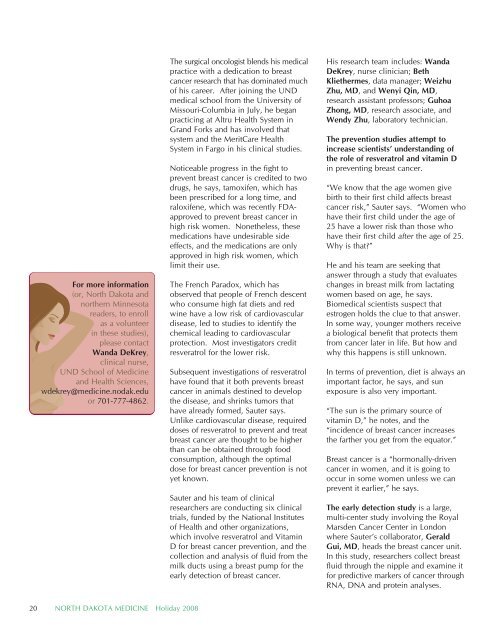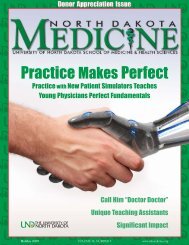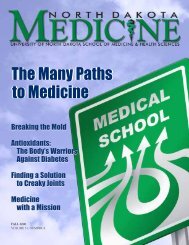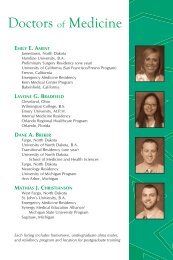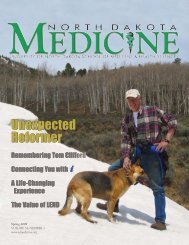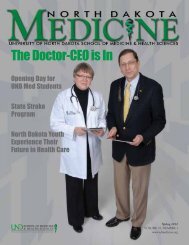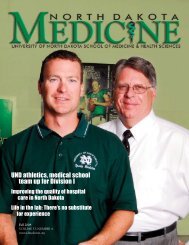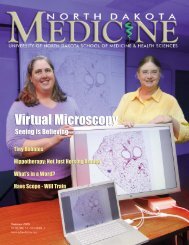Touching Lives Touching Lives - North Dakota Medicine
Touching Lives Touching Lives - North Dakota Medicine
Touching Lives Touching Lives - North Dakota Medicine
Create successful ePaper yourself
Turn your PDF publications into a flip-book with our unique Google optimized e-Paper software.
For more information<br />
(or, <strong>North</strong> <strong>Dakota</strong> and<br />
northern Minnesota<br />
readers, to enroll<br />
as a volunteer<br />
in these studies),<br />
please contact<br />
Wanda DeKrey,<br />
clinical nurse,<br />
UND School of <strong>Medicine</strong><br />
and Health Sciences,<br />
wdekrey@medicine.nodak.edu<br />
or 701-777-4862.<br />
20 NORTH DAKOTA MEDICINE Holiday 2008<br />
The surgical oncologist blends his medical<br />
practice with a dedication to breast<br />
cancer research that has dominated much<br />
of his career. After joining the UND<br />
medical school from the University of<br />
Missouri-Columbia in July, he began<br />
practicing at Altru Health System in<br />
Grand Forks and has involved that<br />
system and the MeritCare Health<br />
System in Fargo in his clinical studies.<br />
Noticeable progress in the fight to<br />
prevent breast cancer is credited to two<br />
drugs, he says, tamoxifen, which has<br />
been prescribed for a long time, and<br />
raloxifene, which was recently FDAapproved<br />
to prevent breast cancer in<br />
high risk women. Nonetheless, these<br />
medications have undesirable side<br />
effects, and the medications are only<br />
approved in high risk women, which<br />
limit their use.<br />
The French Paradox, which has<br />
observed that people of French descent<br />
who consume high fat diets and red<br />
wine have a low risk of cardiovascular<br />
disease, led to studies to identify the<br />
chemical leading to cardiovascular<br />
protection. Most investigators credit<br />
resveratrol for the lower risk.<br />
Subsequent investigations of resveratrol<br />
have found that it both prevents breast<br />
cancer in animals destined to develop<br />
the disease, and shrinks tumors that<br />
have already formed, Sauter says.<br />
Unlike cardiovascular disease, required<br />
doses of resveratrol to prevent and treat<br />
breast cancer are thought to be higher<br />
than can be obtained through food<br />
consumption, although the optimal<br />
dose for breast cancer prevention is not<br />
yet known.<br />
Sauter and his team of clinical<br />
researchers are conducting six clinical<br />
trials, funded by the National Institutes<br />
of Health and other organizations,<br />
which involve resveratrol and Vitamin<br />
D for breast cancer prevention, and the<br />
collection and analysis of fluid from the<br />
milk ducts using a breast pump for the<br />
early detection of breast cancer.<br />
His research team includes: Wanda<br />
DeKrey, nurse clinician; Beth<br />
Kliethermes, data manager; Weizhu<br />
Zhu, MD, andWenyi Qin, MD,<br />
research assistant professors; Guhoa<br />
Zhong, MD, research associate, and<br />
Wendy Zhu, laboratory technician.<br />
The prevention studies attempt to<br />
increase scientists’ understanding of<br />
the role of resveratrol and vitamin D<br />
in preventing breast cancer.<br />
“We know that the age women give<br />
birth to their first child affects breast<br />
cancer risk,” Sauter says. “Women who<br />
have their first child under the age of<br />
25 have a lower risk than those who<br />
have their first child after the age of 25.<br />
Why is that?”<br />
He and his team are seeking that<br />
answer through a study that evaluates<br />
changes in breast milk from lactating<br />
women based on age, he says.<br />
Biomedical scientists suspect that<br />
estrogen holds the clue to that answer.<br />
In some way, younger mothers receive<br />
a biological benefit that protects them<br />
from cancer later in life. But how and<br />
why this happens is still unknown.<br />
In terms of prevention, diet is always an<br />
important factor, he says, and sun<br />
exposure is also very important.<br />
“The sun is the primary source of<br />
vitamin D,” he notes, and the<br />
“incidence of breast cancer increases<br />
the farther you get from the equator.”<br />
Breast cancer is a “hormonally-driven<br />
cancer in women, and it is going to<br />
occur in some women unless we can<br />
prevent it earlier,” he says.<br />
The early detection study is a large,<br />
multi-center study involving the Royal<br />
Marsden Cancer Center in London<br />
where Sauter’s collaborator, Gerald<br />
Gui, MD, heads the breast cancer unit.<br />
In this study, researchers collect breast<br />
fluid through the nipple and examine it<br />
for predictive markers of cancer through<br />
RNA, DNA and protein analyses.


